This week SPI Fellow Marty Klein reports on Norway’s┬ásolution to a flood of immigrants from the Middle East. They’ll take them, but they need cultural re-education, as Norway is one of the world’s most sexually open countries, and Syria… you know. Read Norway, Immigrants, and Sex Education.
It’s the end cap to a great year for the SPI Fellows. Of course the Fellows contributed research and opinion this year, won awards and spoke publicly in so many ways that we could not track them all, but here are a few of their highlights of 2015:
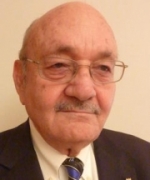 Amatzia Baram gave a report on the state of Lebanon in his article Lebanon’s fragile balance holds amid political paralysis, and contributed to the World Future Guide.
Amatzia Baram gave a report on the state of Lebanon in his article Lebanon’s fragile balance holds amid political paralysis, and contributed to the World Future Guide.
Greg Benford is a multiply award-winning science fiction author whose blog contains poetry about bout life, the universe, and everything. He is faculty of the Department of Physics and Astronomy at the University of California, Irvine.  He is also a contributing editor of Reason magazine, wrote an article about Pluto for Air and Space Magazine, and published an adventure novel, Against Infinity.
Thure Cerling,┬áa professor at┬ágeology, geophysics, and biology at the University of Utah, has found that African mammals’ diets have switched over time.
Elliot Cohen is a philosopher who has written a whopping twenty-five books, including What Would Aristotle Do?: Self-Control Through the Power of Reason and The Theory and Practice of Logic-Based Therapy. He also contributed to the World Future Guide.
Christopher DiCarlo┬áruns the┬áOnion Skin Theory of Knowledge (OSTOK) Project┬áand has pioneered critical thinking in debates including┬áAtheism vs. Christianity.┬áHe is currently working on his latest book tentatively entitled Flying Without a Pilot: A Determined Look at the Future of Ethics, Law, and the Value of Human Behavior.┬á┬áHe is a fellow, adviser, and board member of the Society of Ontario Free Thinkers┬áand the┬áCentre for Inquiry Canada.┬á His latest book entitled: How to Become a Really Good Pain in the Ass: A Critical ThinkerÔÇÖs Guide to Asking the Right Questions has achieved best seller status.
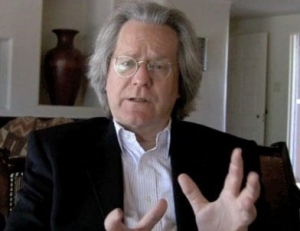 A. C. Grayling spoke to the BBC on┬áThe Meaning of Life According to AJ Ayer, wrote about how religion seems to be growing when it isn’t, was interviewed by the Atheist Debates Patreon Project, gave a speech urging students to have more courage, and contributed to the World Future Guide. He wrote about the Middle East immigration crisis in┬áThe irony of migrancy.
A. C. Grayling spoke to the BBC on┬áThe Meaning of Life According to AJ Ayer, wrote about how religion seems to be growing when it isn’t, was interviewed by the Atheist Debates Patreon Project, gave a speech urging students to have more courage, and contributed to the World Future Guide. He wrote about the Middle East immigration crisis in┬áThe irony of migrancy.
Silvian Ionescu of Romania also contributed to the World Future Guide. He has a Ph.D. in Materials Science and Engineering from Lucian Blaga University and a Ph.D. in Management from the Academy of Economic Sciences in Bucharest. He has also been┬áheavily involved in politics, having spent fifteen years Chief of Service for the Romanian Ministry of the InteriorÔÇÖs Intelligence Department. Recently, he also served as President of┬áthe Democratic Liberal Party for the 3rd District of Bucharest.
Aymenn Jawad Al-Tamimi contributed to the World Future Guide and gave Middle East policy advice in┬áWhy America Should Aim to ContainÔÇô Rather Than Destroy ÔÇö ISIS.┬á
Mark Juergensmeyer wrote about how cooperating with Iran might help the US defeat ISIS, and offered a poignant perspective on the attacks in Paris in his newly published article, Why ISIS Attacked Paris. He also analyzed the religion of ISIS in What Kind of Islam is That? Talking With Refugees from ISIS. In an interview he spoke about how religion fuels conflict in the Middle East.
John Joseph Kisakye is a professor of biology at the College of Natural Sciences at Makerere University in Ugand, an expert in parasitology and dragonflies,
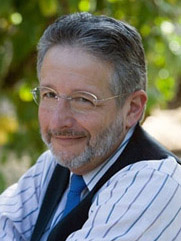 Marty Klein was the┬ákeynote speaker at the National Sex Education Conference┬áin New Jersey and writes regular articles on sexual freedom including┬áGiving Thanks for Sex; HoweverÔǪ. He also gave Ten Lessons that Humanists Need to Learn about Sex┬áand wrote about the Ashley Madison hacker scandal on why perusing photos online doesn’t necessarily lead to cheating. He also wrote about┬ánine major myths about pornography.
Marty Klein was the┬ákeynote speaker at the National Sex Education Conference┬áin New Jersey and writes regular articles on sexual freedom including┬áGiving Thanks for Sex; HoweverÔǪ. He also gave Ten Lessons that Humanists Need to Learn about Sex┬áand wrote about the Ashley Madison hacker scandal on why perusing photos online doesn’t necessarily lead to cheating. He also wrote about┬ánine major myths about pornography.
Patrik Lindenfors contributed to the World Future Guide and wrote about Europe’s immigration emergency in┬áRefugees Crisis: Humanists call for a strong and humane EU response.┬áHe has his own blog, but you’ll need a browser that translates if you don’t read Swedish.
Elizabeth Loftus was interviewed by NPR about false memories, gave a TED Talk called How Reliable is Your Memory?,┬áand contributed to the World Future Guide. She was the focus for a Washington Post article on the failing memory of US Presidential candidate Donald Trump. She appeared in┬áan interview that explored the ┬áÔÇ£Religious ExperienceÔÇØ from a neurologist’s perspective.
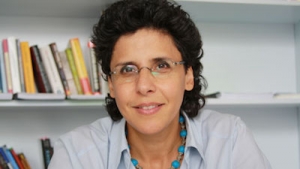 Elham Manea wrote about death sentences for apostasy, wrote about human rights as a universal imperative, and contributed to the World Future Guide. She has been active as the spokesperson for jailed Saudi blogger Raif Badawi. She spoke with former UN special rapporteur, Frank La Rue, in Switzerland, and was appointed by the Swiss Federal Council as a Member of the Federal Commission for Women Affairs. She also wrote to argue for regulation of the religious wearing of a veil.
Elham Manea wrote about death sentences for apostasy, wrote about human rights as a universal imperative, and contributed to the World Future Guide. She has been active as the spokesperson for jailed Saudi blogger Raif Badawi. She spoke with former UN special rapporteur, Frank La Rue, in Switzerland, and was appointed by the Swiss Federal Council as a Member of the Federal Commission for Women Affairs. She also wrote to argue for regulation of the religious wearing of a veil.
John McWhorter wrote about why words become taboo┬áincluding┬áWhy ÔÇ£RedskinsÔÇØ Is a Bad Word,┬áand gave advice on racial activists┬áon his CNN post entitled, Note to protesters: Rage wonÔÇÖt work┬áand another,┬áBlack Lives Matter is Living in the Past. He wrote an article on disappearing languages for The Atlantic,┬áWhere Do Languages Go to Die?┬áand also wrote on how cultures imitate and “borrow” from each other, and explained┬áthe racism in the sequel to Kill a Mockingbird.
Holger Mey contributed to the World Future Guide. He has published more than 150 articles in major security policy journals, newspapers, and books. He is also the editor, co-author, or author of a number of books, including Deutsche Sicherheitspolitik 2030, 2001 (German Security Policy in the 21st Century, 2004).
Ian Morris published Foragers, Farmers, and Fossil Fuels- How Human Values Evolve, and another of this books,┬áWhy the West RulesÔÇöFor Now, ┬áwas featured in the article, Stop-and-Seize Turns Police Into Self-Funding Gangs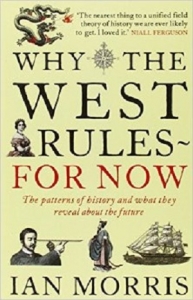 .┬áHe also says that monkeys have an innate sense of justice. He was interviewed on the secular podcast,┬áRationally Speaking.
. He also says that monkeys have an innate sense of justice. He was interviewed on the secular podcast, Rationally Speaking.
Taslima Nasrin┬áis a Bengali author and former physician who has lived in exile since 1994, due to threats coming from her criticism of religion. See her┬áspeech,┬áWhy Secularism is Necessary for WomenÔÇÖs Freedom, at the┬áWomen in Secularism III conference┬áin Alexandria, Virginia, USA. She was also listed #6 on a terrorist hit list, so she must be doing something right. She won┬áthe Emperor Has No Clothes Award at the Freedom From Religion FoundationÔÇÖs annual convention.
Greg Neimeyer contributed to the World Future Guide and runs psychgradprep.net for undergraduates wishing to maximize their chances of getting into a psychology graduate school.
John Allen Paulos is an American professor of mathematics at Temple University, who speaks on Stories vs. Statistics┬áand the┬áauthor of several books including┬áInnumeracy: Mathematical Illiteracy and its Consequences and┬áIrreligion: A Mathematician Explains Why the Arguments for God Just DonÔÇÖt Add Up?
Kevin Perrott is a leader in the movement to extend the natural healthspan of humans so that people could feel as healthy as 40 years old in their 80s. We interviewed him at length for the SPI newsletter.
Donald Prothero┬áis an American geologist and mammalian┬ápaleontologist who was one of the first to conduct research┬áin┬ámagnetostratigraphy, a technique to date rock layers that is┬áused to examine┬áhistorical┬áclimate changes. He spoke about┬áone of historyÔÇÖs largest victims of climate change:┬á dinosaurs, in Is ÔÇ£BrontosaurusÔÇØ Back? Not So Fast!┬áHe also published┬áa book,┬áThe Story of Life in 25 Fossils.
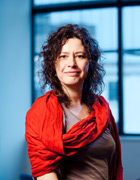 Sarbagh Salih┬áis a secular female┬áKurdish scientist living in the Kurdish Region of Iraq and was previously a scientist for the US Department of Agriculture┬áwith an expertise┬áin biodiversity and plant life. ┬áShe is┬áwith the American University of Iraq and also has her own foundation ÔÇô the Kurdish Botanical Foundation. Her husband, Dr. Batham Ahmed Salih, is the former Prime Minister of the Kurdistan Regional Government and Deputy PM for Iraq as well as┬áthe founder of the American University of┬áIraq.
Sarbagh Salih┬áis a secular female┬áKurdish scientist living in the Kurdish Region of Iraq and was previously a scientist for the US Department of Agriculture┬áwith an expertise┬áin biodiversity and plant life. ┬áShe is┬áwith the American University of Iraq and also has her own foundation ÔÇô the Kurdish Botanical Foundation. Her husband, Dr. Batham Ahmed Salih, is the former Prime Minister of the Kurdistan Regional Government and Deputy PM for Iraq as well as┬áthe founder of the American University of┬áIraq.
Michael Semple,┬áVisiting Research Professor in the Institute for the Study of Conflict Transformation and Social Justice at QueenÔÇÖs University Belfast, has written an article for the International Institute for Strategic Studies, Making Peace with the Taliban
David Sloan Wilson 
rebutted a New York Times article about learning the wrong corporate management lessons from Darwinism, by writing Jeff Bezos got Darwinism all Wrong!  Ruthless competition is a prescription for disaster. He sat down with Cornell economist Robert Frank to discuss his latest book The Darwin Economy.  He also wrote that a solid understanding of evolution could help us become more moral human beings and appeared on a podcast to explain how understanding evolution can improve the world and why people believe silly things.
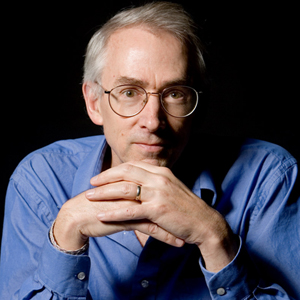 SPI Fellow David Sloan Wilson, the SUNY Distinguished Professor of Biology and Anthropology at Binghamton University and President of the Evolution Institute, will present a lecture at George Mason University at F.A. the Hayek Program for Advanced Study in Philosophy, Politics, and Economics. Hosted by the economist Peter Boettke, the February 11 speech is titled, Updating Hayek on Cultural Group Selection.
SPI Fellow David Sloan Wilson, the┬áSUNY Distinguished Professor of Biology and Anthropology at Binghamton University and President of the Evolution Institute, will present a lecture┬áat┬áGeorge Mason University at┬áF.A. the Hayek Program for Advanced Study in Philosophy, Politics, and Economics. Hosted by the economist Peter Boettke, the┬áFebruary 11 speech is titled, Updating Hayek on Cultural Group Selection.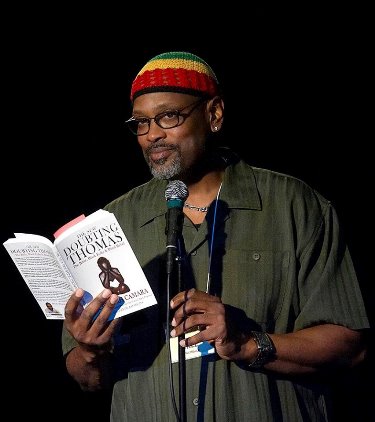 SPI Advocate Steve Hill┬áwill host Steve Hill’s 47% Comedy Show: Comedy for the Middle Class, Saturday, January 16 in Palmdale, CA. It’s a huge fundraiser for Vital Intervention and Directional Alternatives (VIDA), a structured 16-week program for non-violent, at-risk youth. The no excuses, unreverent, Black Atheist, community activist, and 2016 candidate running for the California 21st Senatorial District calls the 501.C.3 nonprofit group one of his favorite charities in LA County.
SPI Advocate Steve Hill┬áwill host Steve Hill’s 47% Comedy Show: Comedy for the Middle Class, Saturday, January 16 in Palmdale, CA. It’s a huge fundraiser for Vital Intervention and Directional Alternatives (VIDA), a structured 16-week program for non-violent, at-risk youth. The no excuses, unreverent, Black Atheist, community activist, and 2016 candidate running for the California 21st Senatorial District calls the 501.C.3 nonprofit group one of his favorite charities in LA County.
 This week we focus on SPI coalition group 
This week we focus on SPI coalition group  One table will promote the
One table will promote the 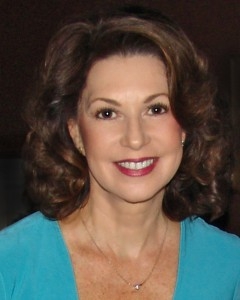 They celebrate his birthday on January 29, are working to erect a statue with a world-famous sculptor, creating a coloring book for children, and a compilation of Thomas Paine’s original music. They also present Thomas Paine to grade schools at special assemblies.
They celebrate his birthday on January 29, are working to erect a statue with a world-famous sculptor, creating a coloring book for children, and a compilation of Thomas Paine’s original music. They also present Thomas Paine to grade schools at special assemblies. 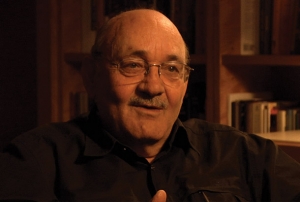 SPI Fellow┬á
SPI Fellow 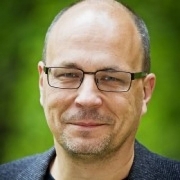 SPI Fellow
SPI Fellow  In the American system there are only two main political parties,┬áthe Democratics and the Republicans, and each will need to choose a single candidate for the 2016 US presidential election. This is done by having each state vote, in┬áa series of “caucuses and primaries”. The first states to vote are especially important, because they show the momentum of each candidate. It’s a test of strength that may indicate how these candidates will do nationwide, influencing campaign contributors, volunteers, media attention, and more.
In the American system there are only two main political parties,┬áthe Democratics and the Republicans, and each will need to choose a single candidate for the 2016 US presidential election. This is done by having each state vote, in┬áa series of “caucuses and primaries”. The first states to vote are especially important, because they show the momentum of each candidate. It’s a test of strength that may indicate how these candidates will do nationwide, influencing campaign contributors, volunteers, media attention, and more. Research conducted by Pew Research Center in 2015
Research conducted by Pew Research Center in 2015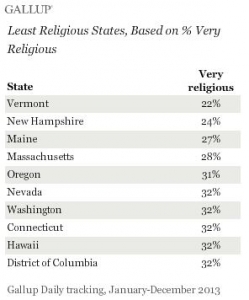 A
A  In New Hampshire the potential for a secular impact is far greater. Though Clinton has been boosted by BidenÔÇÖs decision to stay off the ballot paper, her lead over Sanders has ping-ponged, with Sanders having polled in front on numerous occasions. The reasons for this are abundant, and his ÔÇ£I am who I amÔÇØ politics, devoid of Super-PAC funding, has certainly played a role. But equally important has been his constitutionally secular outlook, and his extensive period as Senator in the most nonreligious state in the USA, Vermont. We should not underestimate the sway this will have over New HampshireÔÇÖs secular bloc come February 9th.
In New Hampshire the potential for a secular impact is far greater. Though Clinton has been boosted by BidenÔÇÖs decision to stay off the ballot paper, her lead over Sanders has ping-ponged, with Sanders having polled in front on numerous occasions. The reasons for this are abundant, and his ÔÇ£I am who I amÔÇØ politics, devoid of Super-PAC funding, has certainly played a role. But equally important has been his constitutionally secular outlook, and his extensive period as Senator in the most nonreligious state in the USA, Vermont. We should not underestimate the sway this will have over New HampshireÔÇÖs secular bloc come February 9th.
 We’ll moderate discussion so you won’t get too many emails. You don’t need to run a group to join. It’s open to everyone who agrees with our goal of separation of church and state!
We’ll moderate discussion so you won’t get too many emails. You don’t need to run a group to join. It’s open to everyone who agrees with our goal of separation of church and state! In 2015 we heard many stories about non-religious bloggers being fined, jailed, or even executed for apostasy — in other words, freedom of speech. Now
In 2015 we heard many stories about non-religious bloggers being fined, jailed, or even executed for apostasy — in other words, freedom of speech. Now 
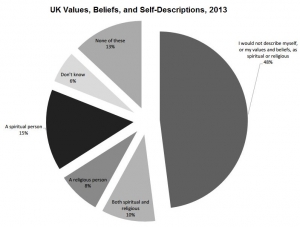 Britain is no longer a Christian country
Britain is no longer a Christian country Atheist Foundation of Australia
Atheist Foundation of Australia Amatzia Baram gave a report on the state of Lebanon in his article
Amatzia Baram gave a report on the state of Lebanon in his article  A. C. Grayling spoke to the BBC on 
A. C. Grayling spoke to the BBC on  Marty Klein was the 
Marty Klein was the  Elham Manea wrote about
Elham Manea wrote about 
 Sarbagh Salih┬áis a secular female┬áKurdish scientist living in the Kurdish Region of Iraq and was previously a scientist for the US Department of Agriculture┬áwith an expertise┬áin biodiversity and plant life. ┬áShe is┬áwith the American University of Iraq and also has her own foundation ÔÇô the Kurdish Botanical Foundation. Her husband, Dr. Batham Ahmed Salih, is the former Prime Minister of the Kurdistan Regional Government and Deputy PM for Iraq as well as┬áthe founder of the American University of┬áIraq.
Sarbagh Salih┬áis a secular female┬áKurdish scientist living in the Kurdish Region of Iraq and was previously a scientist for the US Department of Agriculture┬áwith an expertise┬áin biodiversity and plant life. ┬áShe is┬áwith the American University of Iraq and also has her own foundation ÔÇô the Kurdish Botanical Foundation. Her husband, Dr. Batham Ahmed Salih, is the former Prime Minister of the Kurdistan Regional Government and Deputy PM for Iraq as well as┬áthe founder of the American University of┬áIraq.

 In 2015, SPI executives have:
In 2015, SPI executives have: